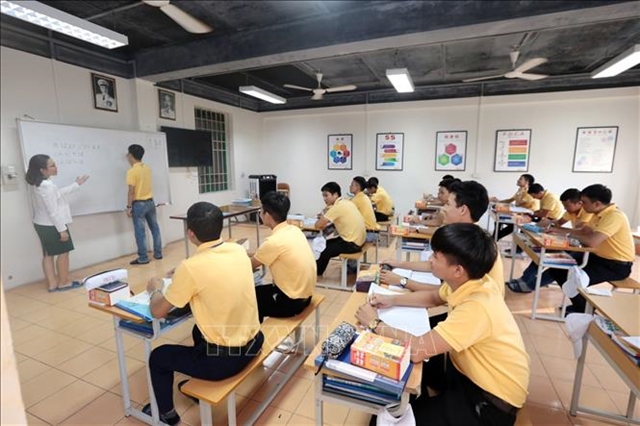 Society
Society


|
| Candidates learn Japanese before arriving in Japan for work. — VNA/VNS Photo Anh Tuấn |
HÀ NỘI — Clear and detailed regulations are needed to strictly punish those who abuse labour export policies to make illegal profits, National Assembly deputies said on Wednesday morning when discussing in groups the draft revised law on Vietnamese guest workers under contract.
They agreed that the revised law must make progress in administrative reform, creating transparency and convenience for labour export companies as well as being an effective tool to punish violators, especially those who sent people overseas for work and irresponsibly left them without any care or support.
Deputy Ngọ Duy Hiểu from Hà Nội said that the revised law needs to include costs workers pay to get a job overseas. In some cases, workers reportedly had to pay a lot to brokers without being aware that the payment was not regulated and even illegal.
“Without clear regulations, many people face financial difficulties when they want to work overseas,” Hiểu said.
Hiểu also said that labour export policies should be in line with human resource development within the country, as Việt Nam was facing an aging population and still had huge demand for quality human resources for its socio-economic development.
Under the draft revised law, a labour export licence can be valid for five years and be extended every five years; the number of extensions is unlimited. Hiểu said it was not necessary to extend the licence.
“The companies will be granted licences if they meet requirements and will have the licences withdrawn if they fail to meet requirements,” he said, questioning the benefits of the licence extension to companies and workers.
Deputy Thích Bảo Nghiêm from Hà Nội said that licensed companies and organisations did a good job when sending Vietnamese workers to other countries for work, but in other cases, Vietnamese illegally lived and worked in other countries.
The deputy recalled the tragedy over the death of 39 Vietnamese people in a refrigerated truck container in Essex, southeast England. He said that in those cases, Vietnamese workers were lured by brokers, which resulted in threats to their safety.
“The illegal guest workers live in other countries without being protected by law,” he said, calling for regulations that help to minimise such incidents.
NA Chairwoman Nguyễn Thị Kim Ngân said that companies found to have collected illegal fees from workers must be strictly punished.
She also said that the Government needed to arrange commercial counsellors in countries where many Vietnamese guest workers were working so they could offer assistance and solve problems.
The draft revised law consists of eight chapters with 79 articles, one article less than the current law. The draft abolishes eight articles, adds nine new ones, and revises about 70 articles of the existing law.
The revision aims to institutionalise the 2013 Constitution and the Party’s recent guidelines on the sending of Vietnamese workers abroad as well as address new problems that the current law dated 13 years ago fails to deal with.
Last year, the country sent 152,530 labourers abroad, surpassing the year’s plan by 27.1 per cent. Japan was the biggest recipient with nearly 83,000 labourers, followed by Taiwan (China) with 54,480, the Republic of Korea (RoK) with 7,215, Romania with 3,478, and Saudi Arabia with 1,375.
By the end of March, about 560,000 Vietnamese people were working in 36 countries and territories worldwide.
Agriculture land-use tax exemption continued until 2025
Việt Nam would continue exempting agriculture land-use tax until 2025 as the National Assembly passed a resolution about it on Wednesday.
The policies on agricultural land use tax exemption and reduction have been implemented in Việt Nam since 2001. The policies are said to encourage investment in agricultural and rural areas, encourage development and expansion of farms, and increase the efficiency of farming land.
The tax exemption policy, which costs roughly VNĐ7.5 trillion (US$322 million) per year from 2021 to 2025, is expected to be an effective direct assistance to farmers and agriculture investors, helping them spend their resources to invest and expand production scale, increase productivity and improve their farming products’ quality.
According to the Finance Ministry, between 2003 and 2010, about VNĐ3.286 trillion of the agricultural land-use tax was exempted or reduced each year. Between 2011 and 2016, the exempted and reduced tax was about VNĐ6.308 trillion each year.
Between 2017 and 2018 as well as this year, the exempted and reduced tax was about VNĐ7.438 trillion each year. — VNS




